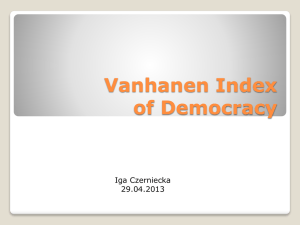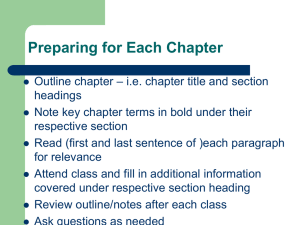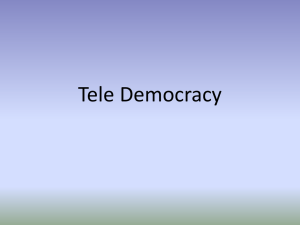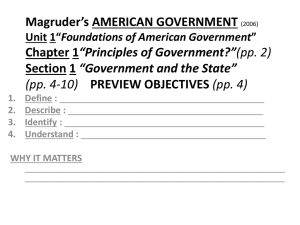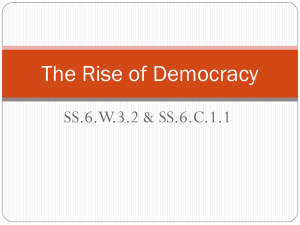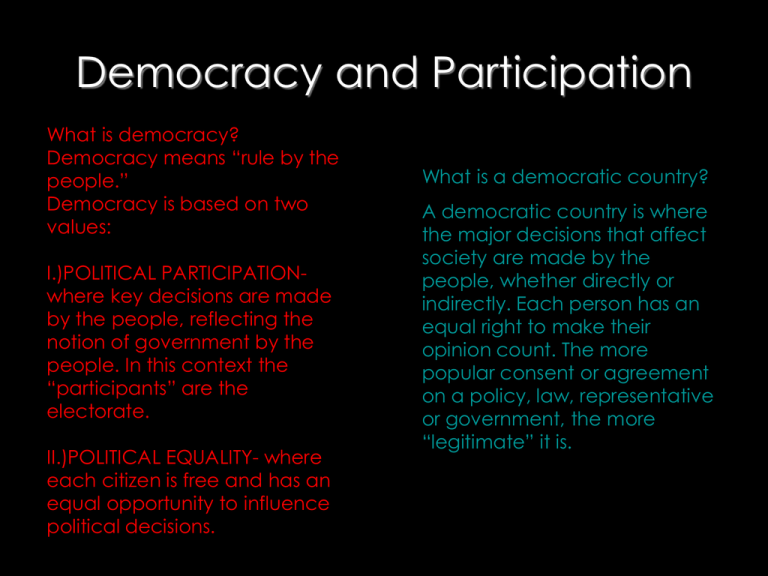
Democracy and Participation
What is democracy?
Democracy means “rule by the
people.”
Democracy is based on two
values:
I.)POLITICAL PARTICIPATIONwhere key decisions are made
by the people, reflecting the
notion of government by the
people. In this context the
“participants” are the
electorate.
II.)POLITICAL EQUALITY- where
each citizen is free and has an
equal opportunity to influence
political decisions.
What is a democratic country?
A democratic country is where
the major decisions that affect
society are made by the
people, whether directly or
indirectly. Each person has an
equal right to make their
opinion count. The more
popular consent or agreement
on a policy, law, representative
or government, the more
“legitimate” it is.
Types of democracy
There are two types of democracy
I.) DIRECT DEMOCRACY- where the people make the key political
decisions by themselves. This abolishes any distinction between the state
and the citizens as it is a form of self-government. The effectiveness of
this model of democracy is directly proportional to the extent of popular
participation.
II.) REPRESENTATIVE DEMOCRACY- this is an indirect and limited form of
democracy where the people choose who shall make decisions on their
behalf. The people vote for their representative who speaks on behalf of
their constituents. The representative can be re-elected or removed
during elections. The success of this model of democracy is also directly
proportional to popular control over the government.
Direct democracy
Features of direct democracy:
I.) Popular participation is direct; citizens themselves make decisions,
they are not confined to choosing individuals who do.
II.) Popular participation is unmediated; the people are the
government, there is no separate elite or ruling-class between the
government and their people.
III.) Popular participation is continuous. Citizens engage in politics on a
regular basis as all decisions are directly made by the people.
Historic examples of direct democracy include Ancient Athens and
communal tribes, whilst modern day examples are the use of referendums
which inform a government’s decision.
Direct democracy
Benefits of direct democracy:
I.) It is the only form of “pure” democracy.
It ensures that people will obey the law, as
many are likely to obey the laws that they
personally approve. Their “general will”
becomes law. There is not a gulf between
the government and the people.
II.) Personal development; direct
democracy leads to an educated society.
Citizens are informed and knowledgeable
as many are encouraged to take part in
politics to understand how their society
works or even should work.
III.) Direct democracy does not allow for
the people to put their faith with elected
politicians who constantly spin doctor the
truth in order to distort public opinion.
IV.) Legitimate government; direct
democracy ensures that government is
stable and 100% legitimate as citizens are
responsible for the decisions they make
and cannot blame anyone else.
Drawbacks of direct democracy:
I.) Direct democracy is incredibly
unworkable in the modern world.
This form of democracy requires all
citizens to engage in politics and
decision-making (reflected in the
idea of political equality.) All citizens
must be able to meet in a single
place to express their opinion. This is
impossible for the entire population.
II.) Also direct democracy implies
that politics is the only job for
citizens, they cannot be expected
to have careers or a personal life,
citizens would not be able to
engage in any other activities.
Representative democracy
Features of
representative
democracy:
I.) Popular participation is
indirect; citizens choose
who make the decisions
through the electoral
vote.
II.) Popular participation
is limited as the act of
voting is limited to every
few years.
III.) Popular participation
is mediated; people are
linked to the government
through various
institutions.
Benefits of representative democracy:
I.) Practical democracy. Representative democracy is the only form of
democracy that is effectively workable in the modern world; popular
participation is brief and limited.
II.) Government by experts. Representative democracy places decisionmaking with professional politicians, these people are generally more
educated and experienced than the masses of the people. Therefore
they are able to govern according to their superior knowledge they
possess for the national interest.
III.) Representative democracy provides mediation between the public
and the government. Ordinary citizens are free to get on with their lives as
they are relieved from the burden of decision-making, allowing many
citizens to have careers and social life as they only choose who gets to
govern.
IV.) Political stability is created. Representative democracy maintains
stability as the public are distanced from politics; the more involved we
become the more passionate and committed we become, unwilling to
accept compromise. Political stability is maintained as citizens of the state
are likely to accept compromise.
Representative democracy
Drawbacks of representative
democracy:
I.) Representative democracy in
theory is a formality. This is because
the act of voting is when the
government decides the election.
The people in theory do not hold
any control over the government
between elections, making
representative democracy
unsuccessful.
II.) There has been a growing
concern of how politicians
represent the people, whether it is
through the doctrine of the
mandate, the delegate model,
trusteeship or by descriptive
representation. Seems that all have
failed to represent those who they
claim to represent.
Liberal democracy
A liberal democracy is a form of
representative democracy, therefore
indirect. The right to rule and govern is
gained through electoral success based on
political equality (one person, one vote). It
combines the liberal goal of limited
government with a commitment to
democracy and popular participation.
In a liberal democracy, the basic conditions
must be met:
-Elections must respect the principle of
universal suffrage and are to be free and
fair.
-Civil liberties and individual rights are
guaranteed
-The government must operate in a legal,
constitutional framework
-A capitalist or private enterprise economy.
A Liberal democracy attempts to balance
the need for democracy with individual
freedoms and rights.
Liberal democracy
There are 2 main types of liberal democracy:
I.) There is CONSTITUTIONAL DEMOCRACY where the government operates within
clear constitutional guidelines, ensuring the protection of individual and minority
rights. Constitutional democracy is associated with countries that have a codified
constitution, USA, France and Germany.
II.) There is MAJORITARIAN DEMOCRACY where majority interests take precedence
over the minorities, as the majority speaks on behalf of the people. This majority rule
emphasizes the collective interests of society, rather than the individual interests.
Constitutional Democracy
VS
Majoritarian Democracy
Protects the individual
Protects society
Divides sovereignty
Parliamentary sovereignty
Proportional elections
Majoritarian elections
Coalition government
Single-party rule (usually)
Fragmented governments
Centralised and stable governments
Democracy in the UK
The main features of the British democratic system
Elections
Elections in Britain are free and fair as they are based on universal suffrage and they provide
electoral choice. Also votes are cast via the secret ballot bringing an end to bribery and
intimidation which ensures that voters can freely express their views at election time.
In 1948, Parliament passed another reform which established the idea of “one person, one vote”
creating political equality. Before this reform many privileged members of society were able to
vote plurally.
In 2000, the Electoral Commission had been established aiming to restore confidence and
integrity in British democracy.
However many have questioned the “fairness” of our electoral process as
I.) Certain key political posts remain unelected, like the Head of State, the House of Lords. Both
institutions lack democratic legitimacy.
II.) The first-past-the-post method has been criticised as many votes are wasted as the winner
needs to achieve a simple plurality of votes. Incredibly tight elections distort the real preferences
of the public.
Democracy in the UK
Universal Suffrage
In 1928 the vote was extended to females, ending gender discrimination,
whilst in 1968 the voting age was lowered to 18. In this country all 18 year
olds regardless of their sex are eligible to vote.
However
I.) There are requirements for the electoral register, resulting in the
homeless, the Lords, prisoners and the mentally ill’s right to vote being
denied.
II.) Although a right to vote is guaranteed, this does not ensure that all
eligible members of society do vote. There have been growing levels of
voter apathy especially in the 1997, 2001 and 2005 elections. Furthermore,
non-voting is common amongst the poor and the most disadvantaged in
society.
Democracy in the UK
Electoral Choice
This element is vital to democracy as voters must have a choice on the
ballot paper. This is ensured by party and candidate competition. Initially we
have had the Conservative Party and the Whigs, and then followed by the
formation of the Liberal, Labour and Social Democratic Parties. Electoral
choice in Britain has constantly evolved. As a result multiparty systems have
emerged from election results.
BUT
I.) The two-party system still remains in Westminster as Labour and the
Conservatives remain the dominant parties, despite the Liberal Democrats.
II.) Electoral choice seems to be an apparent illusion with growing consensus
politics. Both New Labour and the Tories have advocated free market
economics. Voters have little choice on key issues. Elections are mainly won
based on party’s position on the EU and Crime. Contrasting policies are
incredibly narrow.
Democracy in the UK
Pressure Groups
Pressure groups add to the democratic process as they give a voice to those who are
ignored by the majoritarian system. By joining pressure groups citizens exert influence
over the government through elections as they provide a vehicle for participation
beyond the act of voting. Thus pressure groups supplements democracy as it
promotes pluralist democracy leading to real developments in political equality.
BUT
I.) Some pressure groups concentrate power rather than distribute it. Financially
powerful groups are able to buy influence through donation to political parties. Many
argue that business groups have an unfair advantage as the government relies on
their cooperation for the economic proposals.
II.) Pressure groups seem to undermine Parliament as an elected body. They
undermine the representative process, weakening the role of elected officials.
Pressure groups are not popularly elected and unaccountable to the public.
Democracy in the UK
Devolution
In 1998 after successful referendums, Scottish, Welsh and Northern Irish
regional assemblies were created. These nations were given a distinctive
political voice to run local affairs. Parliament would always be dominated
by English Mps likely to ignore other nations. Voters in the respective
regions can express their concerns about their regional issues. Devolution
has also widened participation, strengthening political education.
BUT
I.) Devolution has fallen short as many powers are in reality limited and
can be overturned by Westminster. Major economic decisions and foreign
policy lies with the cabinet and Whitehall.
II.) Devolution has raised the West Lothian Question. Devolution has failed
to advance English democracy. Tam Dayell has called for a separate
English assembly as most British people in England.
Democracy in the UK
The European Union
Britons are able to exercise their influence through the European Union. This is
done via the proportional, fixed term elections to the EU. The proportional
voting system has strengthened the democratic process as parties gain a fair
share of seats from their votes, for example the Green Party, UKIP and the BNP
have done well in the EU elections.
But
I.) Many eurosceptics have argued that the growth in EU power has come at
the expense of Westminster’s. The sovereignty of Parliament has been
undermined and threatened.
II.) In reality the EU has very little influence and control over the European
Commission with little policy-making powers, suffering from an internal
democratic deficit.
A democratic deficit?
Is the UK a truly democratic nation?
British democracy has come under attack by the conflicting ideas of popular
democracy and parliamentary democracy. For example the majority of Britons
opposed the Iraq invasion, yet Parliament declared war. The UK conforms to a
majoritarian democracy. The executive is accountable to Parliament; however
public interest is determined by the executive, not by the public themselves? If the
UK ensures majority rule, civil liberties are likely to be threatened or curtailed.
The Participation Crisis.
Due to increasing voter apathy, many claim that the UK is suffering from a
participation crisis.
In 1997 only 71% of the electorate actually voted, New Labour’s “landslide” victory
was won by more votes that the narrow result of the 1992 election! The membership of
the UK’s political parties has dramatically decreased over the years.
Party loyalty has declined. Many people do not identify themselves with a party or a
set of values. This leads to more marginal seats and more “floating voters.”
However the growth of pressure group membership and activism has increased,
negating the notion of a participation crisis. Maybe the problem lies with
disillusionment of Westminster politics. Nonetheless election turnout is vital to the
health of a representative democracy.
A democratic deficit?
There are three main factors that could explain declining turnouts at election time.
Blame the electorate- it could be argued that society in general has become more materialistic in
this current consumerist society. Thatcher asserted that “there is no such thing as society.” have
we become individuals concerned with our self-welfare. The declining turnout can be seen as an
epidemic with union membership and church attendance also are at an all time low.
Blame the media- the media have caused immense problems for the public to trust and put their
faith into politics. The media have moved away from political analysis to scandalous allegations to
sell papers. Examples include the expenses scandal, cash for honours and the Tory Sleaze during
the 1990s.
Blame the politicians- politicians have done nothing to improve and restore faith back into politics.
Politicians seem to care about nothing other than getting elected, thus lacking a sense of
direction and moral values. “Bigotgate” proved to be the final nail in the coffin for Labour’s 2010
defeat. This claim is also supported by the transition from programmatic parties to catch all ones.
There has been a growth in spin-doctoring. Parties distort the truth to establish a favourable
response in order to gain support. Politics has become “style over substance.” Politicians seem to
create the impression of being lying snakes desperate to have a career.
Parties have distanced themselves from their grass root ideologies. The consensus politics have
explained electoral decline as parties seek to gain the support of middle England.
During election time, parties target marginal seats, thus ignoring the majority voters in safe seats.
Enhancing democracy
Many reforms have been
advocated in order to improve
democracy in the UK.
I.) Widening Direct Participationthis reform includes the wider use of
referendums. A referendum is a
popular vote by which the
electorate expresses their view on
a particular policy. They are used
to inform the government
regarding public opinion. They
differ from elections as they do not
fill a public office. Referendums are
a device of direct democracy.
However referendums are only
used when decided by the
government. Citizens cannot
initiate them. Government only call
referendums that they are likely to
win. Examples include entry to the
EU and the issue of devolution.
For referendums
Against referendums
As referendums constitute direct
democracy, any changes based
on the result of a referendum
would be democratically
legitimate
Referendums only provide public
opinion at a given time. They are
unreliable guide to the public
interest in the long term.
Although many supported the
entry to the EU in the 1970s,
many wish to withdraw from it
today.
Referendums promote political
education. They act as an agent
to widening participation,
sparking debate on particular
issues, leading to an informed
and educated electorate
Referendums undermine
parliamentary sovereignty and
parliamentary democracy;
decisions are not made through
deliberation and government by
experts but by a public who are
uneducated on policy matters in
depth.
Referendums are a check on the
government’s power as
Parliament has little control over
the outcome.
Referendums also lead to
irresponsible government
neglecting their purpose.
Governments are elected to
govern; they make policy
proposals and implement them
and are called to account for
their decisions.
Enhancing democracy
II.) Compulsory Voting- electoral choice depends on the electorate choosing to vote
as well. The participation crisis may be resolved by introducing compulsory voting.
For compulsory voting
Against compulsory voting
Politicians may engage with other electorates in
order in win office as they need to recognise other
concerns than “middle England.” This also promotes
the notion of healthy citizenship, strengthening civic
duty. The more participants in politics, the more they
will think and act as full citizens of the community
and the state.
The notion of compulsory voting goes against the
idea of democracy; it is a violation of individual
freedom. People may choose not to vote as they
may be disaffected by the lack of choice between
parties and the current political system.
Compulsory voting will lead to greater legitimacy.
Governments that are formed based on compulsory
voting would depend on a popular majority, thus
strengthening legitimacy of governments. Popular
support must be widespread for the government’s
right to rule.
Compulsory voting may lead to further wasted votes.
Those who do not vote usually are those who are the
least interested and uneducated in these matters.
Forcing those that fit this description to vote would
inevitably lead to irrational votes being cast. People
may choose to vote based on artificial reasons,
which may disaffect regular voters.
By default compulsory voting would lead to greater
turnout rates. As electoral turnout is vital to
representative democracy, in theory the
participation crisis would be resolved. Genuine
political equality requires that not only do we have a
right to vote, but all do vote.
Compulsory voting may lead to parties changing
their strategies by developing policies to fit marginal
voters rather than the mass of the electorate, thus
distorting the ideological mood of the nation.
Enhancing democracy
III.) Digital Democracymaybe the cause of the
participation crisis lies with
the physical act of voting
being out of touch with the
public. Many of us are tied
with jobs, families and social
lives to find time to vote.
Voting essentially becomes
a burden. Many call for a
modern form of democracy.
Maybe we could
incorporate democracy with
the digital age; interactive
screening, e-mails etc.
For digital democracy
Against digital democracy
Digital democracy allows for
easier participation. Electronic
democracy would allow the
electorate to express their views
easily without having a major
distraction in their everyday life,
having a positive affect on
participation. The “democratic
deficit” may be explained as
former democratic processes
have failed to be modern. If
citizens have the chance to
participate in different forms of
democracy they may well do.
Digital democracy may lead to
electoral malpractice, the main
problem is that it would be hard
to control and scrutinize. Postal
voting has led to alleged
malpractice. The dangers of the
internet results in corruption;
power will end up in the wrong
hands. The present method of
physical voting allows it to be
policed and checked properly.
Digital democracy is relatively
easy to organise, other forms of
democracy such as referendums
requires significant time,
resources and cost to set up.
Digital democracy poses a
threat to the “integrity” of
democracy. It would erode and
demean politics into more of a
reality show and citizens’ rights
are nothing more than
consumer choices.
Enhancing democracy
IV.) Reducing the voting age- Today’s youth are incredibly disaffected due to the tabloid press
labelling us as a bunch of “juvenile delinquents” who carry knifes and post their crimes on youtube.
Maybe lowering the voting age will improve maturity in young people and they may not get such a
hard time from the media. Even the age of the majority is inconsistent. At 16 we can gamble and join
the army but at 18 we can purchase alcohol and violent video games. Many minor parties have
backed the call for votes at sixteen. Independent commissions have also backed this call. With the
growth of a number of youth democratic organisations, lowering the voting age seems to be the next
step.
For lowering the voting age
Against lowering the voting age
By addressing; youth interests, hopeful
politicians would actually have to bring cause
to issues which young people face, drugs,
alcohol, exams etc. youth interests are
increasingly ignored leading to a forgotten
generation.
It may lead to immature voters. Most young
people still live with their parents and remain
in full-time education. They are not yet full
citizens. Most young people would not be
interested in politics. They would resort to
voting whoever their friends choose to vote
for.
It does seems extremely unfair that mature 16
year olds are denied the right to vote yet
uneducated, ignorant adults have this right
and in fact choose not to.
By lowering the voting age, it seems that we
are forcing children to accept adult
responsibilities. It is not a question of their
maturity, but during the difficult time of
adolescence, that state expects them to
make political judgements?
By lowering the voting age the youth maybe
strengthen their interests in politics making the
matter more meaningful. This leads to stronger
political engagement as another section of
society participate in politics.
The belief that young people suffer from
political injustice is absurd. Their votes are only
delayed; their representation is deferred. 18
year old are likely to be in touch with in
interests of 16 and 17 year olds.
www.politicalpromise.co.uk
• UK's number one student politics website



![“The Progress of invention is really a threat [to monarchy]. Whenever](http://s2.studylib.net/store/data/005328855_1-dcf2226918c1b7efad661cb19485529d-300x300.png)
